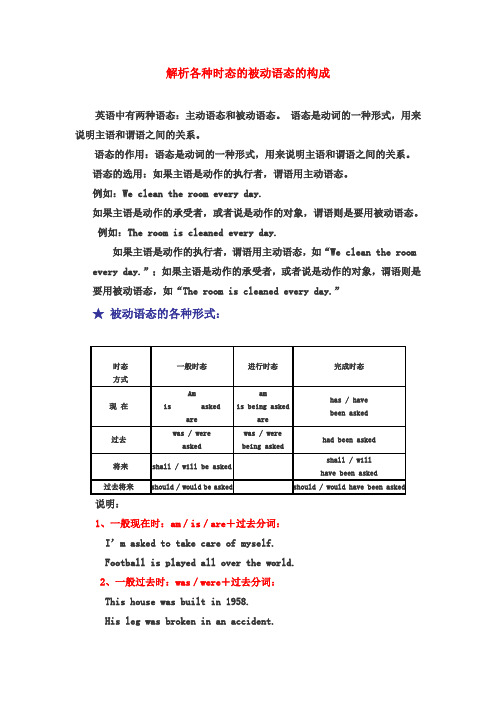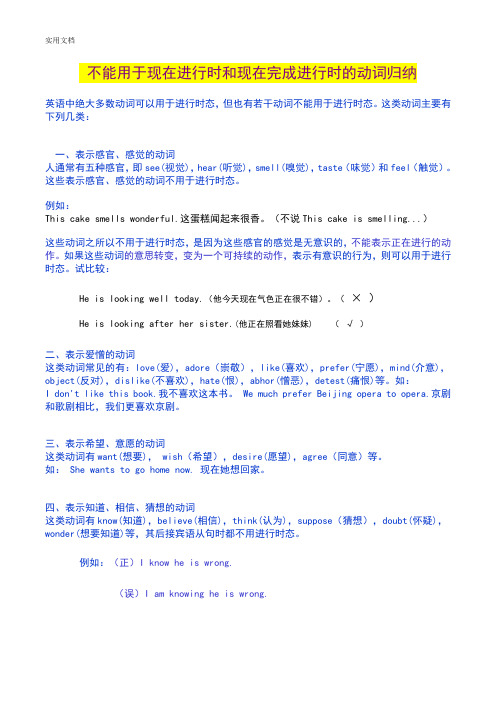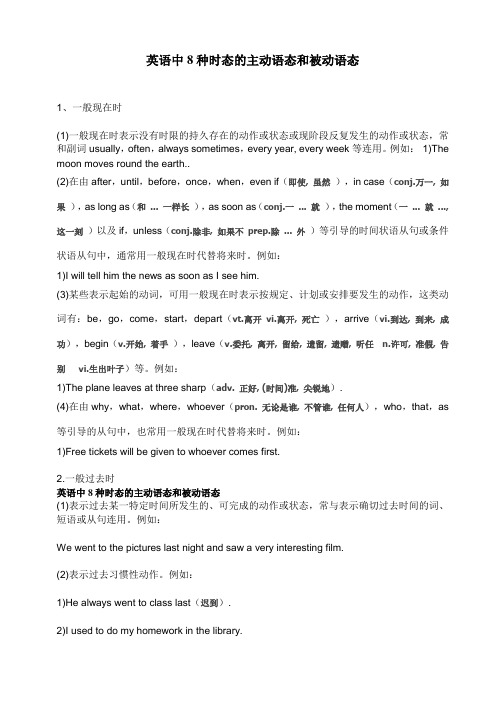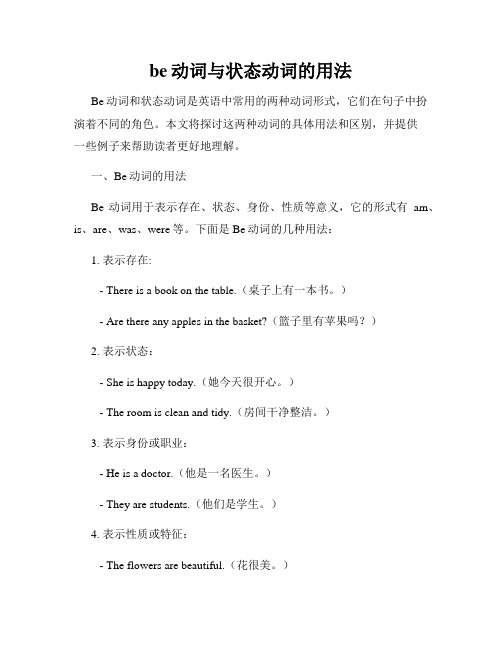不能用于进行时态和被动语态的动词
不能用于进行时态和被动语态的动词

1. belong to属于……Our success belongs to all the people present. 我们的成功属于在座的每一个人。
2. stand, lie等静态动词这些动词表某物位于某处。
There stands a high building over there. 那边矗立着一座高高的楼房。
3. taste, feel, look, smell, sound 等感官动词This kind of food tastes good. 这种食物尝起来味道很好。
Ice always feels cold to us. 对我们来说冰摸起来总是冷的。
4. stay, keep, remain等动词The weather has stayed hot recently.最近天气一直很热。
After his election to a high office, he remained modest. 在被选为高级领导干部之后他仍然谦虚。
5. sell well( 畅销), last well(持久), wash well(耐洗), write well(写起来流畅)等动副搭配This kind of flower sells well. 这种花很畅销。
The pens produced in this factory write well .这家工厂生产的钢笔写起来流畅。
6. wash easily(易洗), break easily(易折), write smoothly(写起来流畅), light easily(易燃)等动副搭配This kind of cloth washes easily. 这种布容易洗。
It is very wet, the match does not light easily.天气很潮湿,火柴不易划着。
7. meet 遇见;碰到I met him in the street at eight yesterday morning. 昨天早晨8点钟我在街上碰到他。
解析各种时态的被动语态的构成

解析各种时态的被动语态的构成英语中有两种语态:主动语态和被动语态。
语态是动词的一种形式,用来说明主语和谓语之间的关系。
语态的作用:语态是动词的一种形式,用来说明主语和谓语之间的关系。
语态的选用:如果主语是动作的执行者,谓语用主动语态。
例如:We clean the room every day.如果主语是动作的承受者,或者说是动作的对象,谓语则是要用被动语态。
例如:The room is cleaned every day.如果主语是动作的执行者,谓语用主动语态,如“We c lean the room every day.”;如果主语是动作的承受者,或者说是动作的对象,谓语则是要用被动语态,如“The room is cleaned every day.”★被动语态的各种形式:说明:1、一般现在时:am/is/are+过去分词:I’m asked to take care of myself.Football is played all over the world.2、一般过去时:was/were+过去分词:This house was built in 1958.His leg was broken in an accident.3、一般将来时:will/shall be+过去分词:More factories will be built in our city.He will be taken to hospital tomorrow.4、现在进行时:am/is/are being+过去分词:A road is being built around the mountain.Many new houses are being built in this city.5、过去进行时:was/were being+过去分词:The meeting was being held when I was there.We were being trained this time last year.6、现在完成时:have/has been+过去分词:This book has been translated into many foreign languages.The prices of many goods have been cut again .7、过去完成时:had been + 过去分词:A new school had been set up by the end of last year.When the anthem had been played the conference began.8、将来完成时:shall/will have + 过去分词:The project will have been completed before July.Your clothes shall have been made for you soon.9、过去将来完成时:should/would have + 过去分词:He told me that his new cloths would be made by his mother.He told me that his new clothes would have been made very soon.★英语被动语态常见考点:动词的语态一般不单独考,而是和时态、语气和非谓语动词一起考,需要注意以下考点。
不能用于现在进行时和现在完成进行时地动词归纳

不能用于现在进行时和现在完成进行时的动词归纳英语中绝大多数动词可以用于进行时态,但也有若干动词不能用于进行时态。
这类动词主要有下列几类:一、表示感官、感觉的动词人通常有五种感官,即see(视觉),hear(听觉),smell(嗅觉),taste(味觉)和feel(触觉)。
这些表示感官、感觉的动词不用于进行时态。
例如:This cake smells wonderful.这蛋糕闻起来很香。
(不说This cake is smelling...)这些动词之所以不用于进行时态,是因为这些感官的感觉是无意识的,不能表示正在进行的动作。
如果这些动词的意思转变,变为一个可持续的动作,表示有意识的行为,则可以用于进行时态。
试比较:He is looking well today.(他今天现在气色正在很不错)。
(×)He is looking after her sister.(他正在照看她妹妹) (√)二、表示爱憎的动词这类动词常见的有:love(爱),adore(崇敬),like(喜欢),prefer(宁愿),mind(介意),object(反对),dislike(不喜欢),hate(恨),abhor(憎恶),detest(痛恨)等。
如:I don't like this book.我不喜欢这本书。
We much prefer Beijing opera to opera.京剧和歌剧相比,我们更喜欢京剧。
三、表示希望、意愿的动词这类动词有want(想要), wish(希望),desire(愿望),agree(同意)等。
如: She wants to go home now. 现在她想回家。
四、表示知道、相信、猜想的动词这类动词有know(知道),believe(相信),think(认为),suppose(猜想),doubt(怀疑),wonder(想要知道)等,其后接宾语从句时都不用进行时态。
英语中8种时态的主动语态和被动语态

英语中8种时态的主动语态和被动语态1、一般现在时(1)一般现在时表示没有时限的持久存在的动作或状态或现阶段反复发生的动作或状态,常和副词usually,often,always sometimes,every year, every week等连用。
例如:1)The moon moves round the earth..(2)在由after,until,before,once,when,even if(即使, 虽然),in case(conj.万一, 如果),as long as(和 ... 一样长),as soon as(conj.一 ... 就),the moment(一 ... 就 ..., 这一刻)以及if,unless(conj.除非, 如果不prep.除 ... 外)等引导的时间状语从句或条件状语从句中,通常用一般现在时代替将来时。
例如:1)I will tell him the news as soon as I see him.(3)某些表示起始的动词,可用一般现在时表示按规定、计划或安排要发生的动作,这类动词有:be,go,come,start,depart(vt.离开vi.离开, 死亡),arrive(vi.到达, 到来, 成功),begin(v.开始, 着手),leave(v.委托, 离开, 留给, 遗留, 遗赠, 听任n.许可, 准假, 告别vi.生出叶子)等。
例如:1)The plane leaves at three sharp(adv. 正好, (时间)准, 尖锐地).(4)在由why,what,where,whoever(pron. 无论是谁, 不管谁, 任何人),who,that,as 等引导的从句中,也常用一般现在时代替将来时。
例如:1)Free tickets will be given to whoever comes first.2.一般过去时英语中8种时态的主动语态和被动语态(1)表示过去某一特定时间所发生的、可完成的动作或状态,常与表示确切过去时间的词、短语或从句连用。
不能用于现在进行时和现在完成进行时地动词归纳

不能用于现在进行时和现在完成进行时的动词归纳英语中绝大多数动词可以用于进行时态,但也有若干动词不能用于进行时态。
这类动词主要有下列几类:一、表示感官、感觉的动词人通常有五种感官,即see(视觉),hear(听觉),smell(嗅觉),taste(味觉)和feel(触觉)。
这些表示感官、感觉的动词不用于进行时态。
例如:This cake smells wonderful.这蛋糕闻起来很香。
(不说This cake is smelling...)这些动词之所以不用于进行时态,是因为这些感官的感觉是无意识的,不能表示正在进行的动作。
如果这些动词的意思转变,变为一个可持续的动作,表示有意识的行为,则可以用于进行时态。
试比较:He is looking well today.(他今天现在气色正在很不错)。
(×)He is looking after her sister.(他正在照看她妹妹) (√)二、表示爱憎的动词这类动词常见的有:love(爱),adore(崇敬),like(喜欢),prefer(宁愿),mind(介意),object(反对),dislike(不喜欢),hate(恨),abhor(憎恶),detest(痛恨)等。
如:I don't like this book.我不喜欢这本书。
We much prefer Beijing opera to opera.京剧和歌剧相比,我们更喜欢京剧。
三、表示希望、意愿的动词这类动词有want(想要), wish(希望),desire(愿望),agree(同意)等。
如: She wants to go home now. 现在她想回家。
四、表示知道、相信、猜想的动词这类动词有know(知道),believe(相信),think(认为),suppose(猜想),doubt(怀疑),wonder(想要知道)等,其后接宾语从句时都不用进行时态。
be动词与状态动词的用法

be动词与状态动词的用法Be动词和状态动词是英语中常用的两种动词形式,它们在句子中扮演着不同的角色。
本文将探讨这两种动词的具体用法和区别,并提供一些例子来帮助读者更好地理解。
一、Be动词的用法Be动词用于表示存在、状态、身份、性质等意义,它的形式有am、is、are、was、were等。
下面是Be动词的几种用法:1. 表示存在:- There is a book on the table.(桌子上有一本书。
)- Are there any apples in the basket?(篮子里有苹果吗?)2. 表示状态:- She is happy today.(她今天很开心。
)- The room is clean and tidy.(房间干净整洁。
)3. 表示身份或职业:- He is a doctor.(他是一名医生。
)- They are students.(他们是学生。
)4. 表示性质或特征:- The flowers are beautiful.(花很美。
)- The sky is blue.(天空是蓝色的。
)二、状态动词的用法状态动词用于描述主语的状态、感觉、感情等,它通常不能和进行时态连用,并且没有被动语态。
常见的状态动词包括:think、feel、seem、appear、have、own、like等。
下面是一些状态动词的示例:1. 感觉或感受:- I feel tired after work.(工作后我感到疲倦。
)- He seems happy about the news.(他似乎对这个消息感到高兴。
)2. 思考或认为:- She thinks it's a good idea.(她认为这是个好主意。
)- They believe he is innocent.(他们相信他是无辜的。
)3. 拥有或持有:- We have a big house.(我们有一幢大房子。
)- They own a successful business.(他们拥有一家成功的企业。
被动语态的用法

被动语态的⽤法被动语态的⽤法学习被动语态的⼏个问题被动语态是动词的⼀种特殊形式,表⽰句⼦中的主语是动作的承受者,汉语往往⽤“被”、“受”、“给”等词来表⽰被动意义。
1. 被动语态的各种时态被动语态(The Passive Voice)是动词的⼀种形式,表⽰主语是谓语动词的承受者。
被动语态便于论述客观事实,故常⽤于科技⽂章、新闻报道、书刊介绍以及景物描写。
被动语态没有将来进⾏时、过去将来进⾏时和完成进⾏时形式。
1)⼀般现在时The boy is called Johnson.2)⼀般过去时Where were you educated?3)⼀般将来时The result will not be announced until 6 o’clock.4)现在进⾏时The road is being repaired.5)过去进⾏时He was being looked after by his sister.6)现在完成时She hasn’t been told about it yet.7)过去完成时She told me that the factory had been closed down.8)将来完成时This project will have been completed by the end of this year.2. 主动语态变被动语态需要注意的⼏个问题.(1)时态保持⼀致。
The teacher punished him many times for his lateness.He has been punished many times for his lateness.(2)谓语为动词短语的被动语态不能丢掉动词短语的介词或副词。
His best friend often looks after him.被动语态He is often looked after by his best friend.(3)主动语态中若有双宾语,将其中⼀个宾语变为被动句的主语,另⼀个宾语不变。
河南专升本考试英语语法系列复习专题——动词时态,被动语态

一、一般现在时1.一般现在时表示经常发生、习惯性动作、客观真理、科学事实、格言,目前的特征、状态、能力等。
2.主句是一般将来时,时间、条件状语从句中用一般现在时表示将来。
如:I’ll go there after I finish my work./ If it rains tomorrow,I won’t go there.3.在以here,there开头的句子里,go,come等少数动词的一般在时表示正在发生的动作。
例如:There goes the bell.铃响了。
There comes the bus.汽车来了。
Here she comes.她来了。
二、现在进行时1.表示正在进行的动作。
2.表示按计划安排即将发生的动作。
例如:She is leaving for Beijing.她要去北京。
He is working as a teacher tomorrow.从明天起他要做老师。
My father is coming to see me this Saturday.这个星期六我爸爸要来看我。
3.代替一般现在时,描绘更加生动。
例如:The Changjiang River is flowing into the east.江水滚滚向东流。
The sun is rising in the east.太阳从东方冉冉升起。
4.大多数动词可用于进行时,但也有些动词不用于进行时。
常见的有:exist,live,understand,mean,owe,belong to ,know,doubt,suppose,remember,forget,believe,trust,want,wish,refuse,like,hate,dislike,prefer,mind,hope等。
三、现在完成时1.表示过去发生的动作对现在产生的影响或结果,或说话时已完成的动作。
例如:I have finished the report./ She has cleand the room.2.表示从过去开始,待续到现在的动作或状态,往往和“for…”, “since…”表述的一段时间状语连用。
- 1、下载文档前请自行甄别文档内容的完整性,平台不提供额外的编辑、内容补充、找答案等附加服务。
- 2、"仅部分预览"的文档,不可在线预览部分如存在完整性等问题,可反馈申请退款(可完整预览的文档不适用该条件!)。
- 3、如文档侵犯您的权益,请联系客服反馈,我们会尽快为您处理(人工客服工作时间:9:00-18:30)。
1. belong to属于……
Our success belongs to all the people present. 我们的成功属于在座的每一个人。
2. stand, lie等静态动词
这些动词表某物位于某处。
There stands a high building over there. 那边矗立着一座高高的楼房。
3. taste, feel, look, smell, sound 等感官动词
This kind of food tastes good. 这种食物尝起来味道很好。
Ice always feels cold to us. 对我们来说冰摸起来总是冷的。
4. stay, keep, remain等动词
The weather has stayed hot recently.最近天气一直很热。
After his election to a high office, he remained modest. 在被选为高级领导干部之后他仍然谦虚。
5. sell well( 畅销), last well(持久), wash well(耐洗), write well(写起来流畅)等动副搭配
This kind of flower sells well. 这种花很畅销。
The pens produced in this factory write well .这家工厂生产的钢笔写起来流畅。
6. wash easily(易洗), break easily(易折), write smoothly(写起来流畅), light easily(易燃)等动副搭配
This kind of cloth washes easily. 这种布容易洗。
It is very wet, the match does not light easily.天气很潮湿,火柴不易划着。
7. meet 遇见;碰到
I met him in the street at eight yesterday morning. 昨天早晨8点钟我在街上碰到他。
注:meet表迎接时有被动语态。
如:
I was met at the airport by all my old friends in that city. 该城老友全都到机场迎接我。
8. weigh 物体所称重量为……
This stone weighs 200 tons. 这块石头重200吨。
但是当weigh表示“称……”时有被动语态。
如:
This stone will be weighed this evening. 今晚这块石头将被称出重量。
9. open店铺开门营业
This shop doesn't open on Sunday. 这家商店周日不开门营业。
但是,当open表“打开;开幕;开张”时有被动语态。
如:
This door was opened by Li Ping. 门是被李平打开的。
This sports meeting will be opened next week.运动会将于下周开幕。
come into being
形成;产生(不可用于被动语态或进行时)
When did the Roman Empire come into being?罗马帝国是什么时候形成的?
How, then, has this historical characteristic come into being? 那末,这个历史特点是怎样形成的呢?
When did the genuine Asian Games come into being? 安妮:真正的亚运会是什么时候诞生的?
When did the world come into being? 世界是什么时候形成的?
A new rule will soon come into being 一个新规则很快就要出台了。
Their army came into being in 1938. 他们军成立于1938年。
The children are puzzled how the world came into being. 孩子们对世界是怎样形成的感到莫名其妙。
联想拓展
come into existence 形成;产生;开始存在come into effect/force/operation开始生效;开始实施
come into use 开始被使用
come into power上台执政
come into fashion 开始流行
come into office 就职
come into action 开始行动
We do not know when this world came into being.
我们不知道世界是何时形成的。
单项填空
Before the computer , people could never imagine it could bring about such great changes to human life. (2009·12·福建龙岩一中检测)
A. came into being
B. was discovered
C. was come into being
D. was formed
解析:选A。
句意为:在电脑出现之前,人们绝不会想到它会给人类的生活带来如此巨大的变化。
电脑不能说是“被发现”或“被形成”的,排除B、D两项。
come into being不能用于被动语态和进行时,排除C项,故选A。
巩固性练习:
1. It is said that this kind of machine ______ well.
A. sells
B. is sold
C. is selling
D. is being sold
2. The shop ______ last Friday ______ on Sunday.
A. opened; is not opened
B. was opened; is not opened
C. opened; does not open
D. was opened; does not open
3. It was in the street that ______.
A.I was meeting him
B. he was met
C.I meet him
D. he was being met
4. To all the people here ______ success.
A. is belonged
B. is belonging
C. belongs
D. does belong
5. This kind of flower ______ good.
A. is smelling
B. is smelt
C. smells
D. is being smelt
Key:1. A 2. C 3. C 4. C 5. C。
